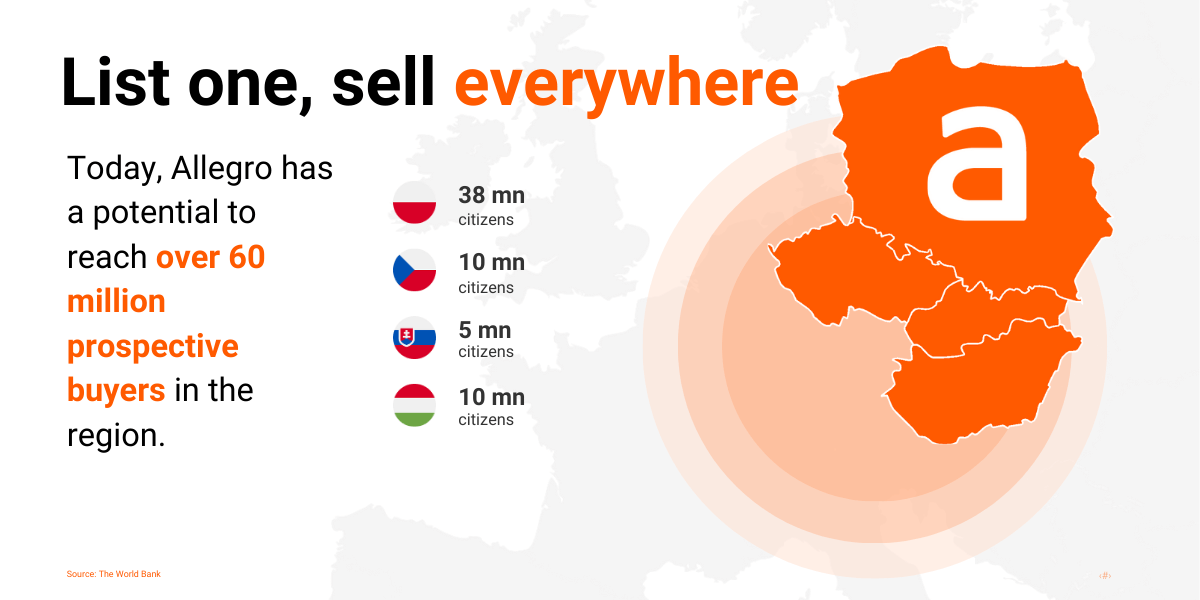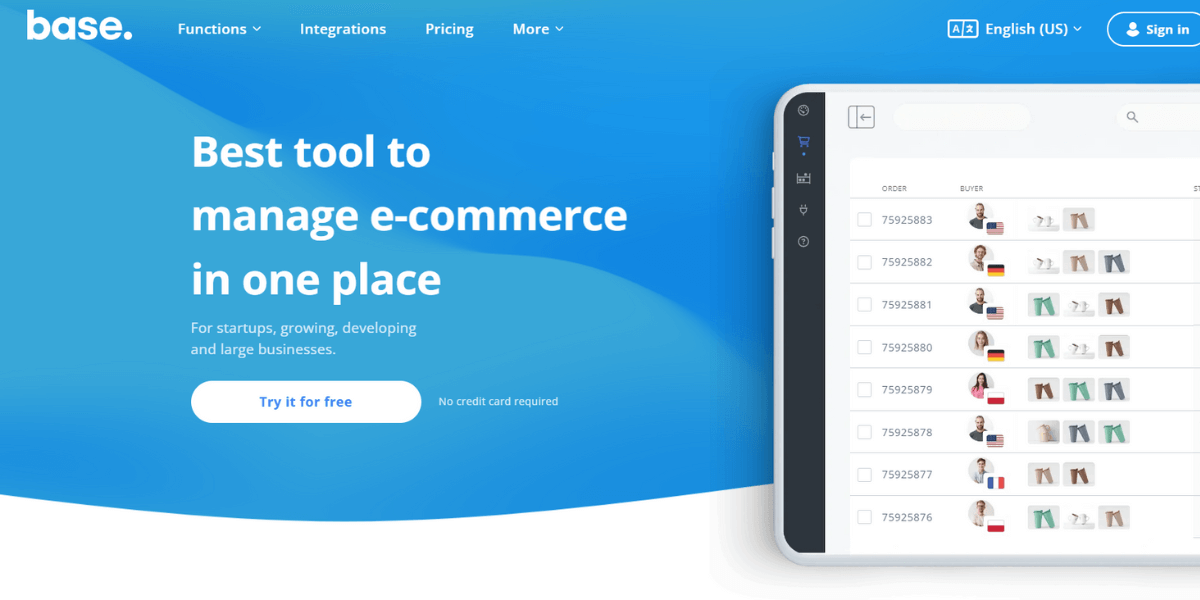How to reach more than 20 000 000 online customers in Europe?
Written by
Editorial TeamPublished on
Discover how to unlock access to over 20 million online customers in Central and Eastern Europe (CEE), the fastest-growing e-commerce market in Europe. Join an exclusive webinar on January 22nd to learn how Allegro and Base can streamline your entry into this dynamic region, offering practical strategies and tools to expand your business effortlessly. (Ad)

Commercial collaboration
The CEE region is now the fastest-growing one in terms of e-commerce, presenting exciting opportunities for merchants to dig in. Key markets like Poland, Czechia, Hungary, and Slovakia show particularly promising trends. Understanding the region’s dynamics and leveraging the right platforms is essential for businesses interested in capitalizing on this growth.
Learn how to reach over 20 million eager customers in this area – to get you started, we’re hosting an exclusive webinar on January 22nd, specifically for German merchants interested in entering or growing their presence in the CEE markets. Here is a sneak peek of what you can expect!

Why Central and Eastern Europe?
CEE is one of the most dynamic and rapidly growing e-commerce regions in Europe, showing a big potential for all merchants from other European countries. In 2023, e-commerce accounted for over 16% of retail sales in the region, and the numbers keep climbing. Let’s take a closer look at some of the key markets:
- Poland: As the largest market in the region and the next super economy of Europe, Poland stands out as the key player in the e-commerce scene today, with the highest value of the market (€30.5 billion in 2023). Poland also has the highest spending in the region, measured at over €990 per capita in 2023. The market is projected to grow by 8% annually, offering sustained opportunities for international merchants.
- Czech Republic: The Czech market, with a population of over 10 million, generated e-commerce sales of €5 billion in 2023. It boasts a highly developed digital infrastructure and a rapidly expanding online consumer base.
- Slovakia: Slovakia, with a population of about 5.5 million, saw e-commerce sales reach €2.1 billion in 2023. The country is growing rapidly in digital adoption, being the one that dominates online shopping in the region (86% of online shoppers against 75% of the EU average).
- Hungary: With a population of approximately 10 million and a growing e-commerce market worth €2 billion in 2023, Hungary is a prime destination for international businesses, taking first place in cross-border e-commerce (61% of Hungarians bought from abroad in 2023).
Even though the countries of the CEE region are poorer than their Western neighbors, the e-commerce industry’s growth rate is far ahead of Western markets. What is more, in 2023, the percentage of online shoppers in Slovakia, Czechia, Hungary, and Estonia surpassed the European Union average. For German merchants, this means millions of new potential customers and an exciting opportunity for long-term growth.
However, success requires a thorough understanding of cultural and operational differences. Businesses ought to consider local consumer behavior, payment preferences, and regulatory requirements unique to each country. Cultural nuances, such as language and communication styles, play a significant role in building customer trust. Additionally, adapting logistical operations to meet regional expectations, such as delivery speed and return policies, is critical for establishing a positive presence in the CEE market.

Unlocking new horizons: Benefits and challenges for German sellers in the CEE market
Expanding into the CEE market offers both significant opportunities and challenges. By understanding the dynamics of this rapidly growing region, German merchants can position themselves for success while addressing potential hurdles. Below is an overview of the benefits and challenges of entering this market.
Benefits:
There are many advantages for German sellers to expand into the CEE market. The region’s rapid growth, combined with an increasing number of online shoppers, creates significant opportunities for businesses. Here are some key benefits of entering this market:
- Access to a high-growth market: The CEE region is home to millions of untapped consumers. Therefore, the market offers immense potential for long-term revenue growth as the middle class expands and purchasing power increases.
- Digital adoption: The region’s rapidly expanding e-commerce sector, driven by increasing internet penetration and digital literacy, presents a significant opportunity for German businesses to expand their online presence. The consumer base is vast and tech-savvy, valuing convenience and variety in purchasing decisions.
- Established platforms: Platforms like Allegro offer infrastructure and trust that facilitate entry into the market. These platforms provide an established customer base, enhanced credibility, and secure payment systems, making them an ideal launchpad. Additionally, they often offer localized support, reducing the complexities of market entry.
The combination of rapid economic growth, the increasing prevalence of online shopping, and the presence of reliable e-commerce platforms such as Allegro, makes the CEE region a prime target for German merchants. By strategically entering this market, businesses can establish a strong foothold, tap into a growing consumer base, and benefit from the region’s evolving digital ecosystem.
Challenges:
While the CEE e-commerce sector presents immense opportunities, it also comes with unique challenges that businesses must address to succeed. Here are the key hurdles for German sellers:
- Cultural and regulatory differences: The CEE region is a diverse area that encompasses a variety of cultures, languages, and legal systems, making it a complex market for business. To effectively enter this market, sellers must develop tailored strategies.
- Logistics: Efficient cross-border shipping and logistics are key to success in the CEE market. However, managing the complexities of international shipping – such as coordinating with local courier services, ensuring timely deliveries, and handling customs procedures – can be a significant challenge. Additionally, the varying standards of infrastructure across different CEE countries necessitate that businesses adapt their logistical strategies to ensure cost-effectiveness and reliability, while maintaining a high level of customer satisfaction.
- Competitive pricing: Consumers in the CEE region tend to be highly price-sensitive, and the market is often very competitive. Sellers must carefully consider local pricing trends and regional differences in purchasing power to avoid deterring potential customers. Finding a balance between offering competitive pricing and maintaining profitability, especially when accounting for exchange rates and operational costs, presents itself as a significant challenge.
- Building trust with consumers: Establishing a brand presence in a new market involves earning customer trust through transparent policies, quality assurance, and localized customer support services. It is crucial for ensuring repeat business and customer loyalty.
In conclusion, while there are clear benefits to expanding into the CEE market, businesses must approach the region with a thorough understanding of local nuances. By addressing cultural and regulatory differences, managing logistical challenges, maintaining competitiveness through pricing strategies, and building trust with consumers, German sellers can successfully tap into the growth potential of this promising market.

Allegro – the largest e-commerce company in Europe that can help you succeed in CEE markets
With over 25 years of experience, Allegro has earned a reputation as a trusted platform that connects sellers and consumers in the CEE region. It’s the largest e-commerce platform in Poland, with 19.6 million active users and almost 150,000 international sellers. Operating in six key markets—Poland, Czechia, Slovakia, Hungary, Slovenia, and Croatia—Allegro connects businesses with a total addressable market valued at approximately €315 billion. With a potential of reaching 60 million people, Allegro is one of the strongest players in Europe.
According to Allegro’s latest financial report, Q1 2024 saw impressive profit growth. Gross Merchandise Volume (GMV) in the Polish marketplace reached nearly €3.3 billion, up 10 percent year-on-year.
What sets Allegro apart is its commitment to simplifying e-commerce for both buyers and sellers. Known as one of Europe’s most trusted platforms, it provides a safe, efficient, and scalable way to grow your business. Its user-friendly design, extensive product range, and competitive prices make it the go-to destination for millions of shoppers. The platform has managed to build a significant level of trust by prioritizing secure transactions, efficient shipping, and comprehensive customer support. For merchants, this means access to a loyal customer base that values both quality and convenience. Here is how Allegro can help your cross-border business succeed:
- Allegro Smart!: This loyalty program, which offers benefits like free shipping, is a game-changer for customer retention. Sellers in the Smart program grow five times faster than those who aren’t. With 6 million Polish members and 520,000 international members, joining Smart! helps you build lasting customer relationships.
- Allegro One Fulfillment: You don’t have to worry about logistics; Allegro offers ready-to-ship options for each marketplace, and sellers have access to Allegro’s official One Fulfillment warehouse. With 85% of orders delivered within 1–2 days, this service streamlines your operations, letting you focus on growing your business.
- Allegro Ads: Allegro’s in-house advertising platform provides targeted, user-friendly monetization, attracting more than 25% of merchants and providing them with a proven high return, generating an additional 11x GMV for every zloty invested.
- Allegro Pay: Simplify the checkout process for your customers with Allegro Pay, an integrated fintech solution designed to boost conversions and enhance customer satisfaction.
Since 2022, Allegro’s expansion to international markets, from Czechia and Slovakia (2022), to Croatia and Slovenia (2025), demonstrates the ambition to dominate the broader European e-commerce landscape. Today, it’s a top choice for businesses looking to expand their reach across Europe.
To top it all off, Allegro ensures a smooth onboarding process for foreign sellers. Setting up a business account is fairly quick and painless with step-by-step guides and adequate support available every step of the way. Moreover, solutions like the Welcome Pack make a successful expansion to new markets attainable. Each new seller qualifies for a handful of perks, including a significant discount on sales commission (up to 100%!) providing more profit, and free Features that successfully drive traffic to your listings. Merchants are also equipped with a plethora of tutorials and marketing tools for quickly familiarizing themselves with the platform and optimizing their listings for the CEE audience.
All of this aligns perfectly with Base’s centralized e-commerce management system, which simplifies multi-channel operations for businesses. By integrating Allegro with Base, sellers can streamline their workflows, synchronize inventory across platforms, and automate logistics, making it easier to scale operations in the dynamic CEE market.
Base is the best tool to manage e-commerce in one place
Base, formerly Baselinker, is a very powerful, all-in-one e-commerce management platform from Poland that simplifies multi-channel sales operations. Designed for modern businesses, it enables seamless integration of online stores, marketplaces, and shipping services, providing a centralized solution for managing your entire e-commerce workflow.

The platform supports over 1,300 integrations, connecting businesses with leading platforms like Allegro, Amazon, and eBay, as well as smaller, region-specific marketplaces. This allows sellers to expand across multiple channels effortlessly while maintaining consistent operations. Key features for merchants include:
- Order management system: Base integrates orders from multiple platforms into a single, intuitive dashboard, saving time and reducing the risk of errors. This allows businesses to manage and monitor all transactions efficiently without switching between different systems.
- Inventory synchronization: The platform ensures real-time inventory updates across all connected sales channels. This feature helps businesses prevent overselling, manage stock effectively, and maintain accurate product availability, which is crucial for meeting customer expectations and avoiding logistical issues.
- Product management tools: Base helps with managing product listings with features like bulk product uploads, batch editing, and automated synchronization of product data across platforms.
- Shipping management: There is a whole system automatizing the logistics process, including generating shipping labels, tracking packages, and managing customer returns. The system integrates with multiple courier services, making it easier to handle shipping efficiently.
Base supports localization with integrated translation tools, helping sellers tailor product descriptions and customer communications to diverse European markets. It also simplifies compliance with regional regulations, offering tools to navigate tax, invoicing, and data protection requirements. When integrated with Allegro, Base enables seamless inventory synchronization, automated listings, and optimized shipping, creating a powerful solution for efficient, multi-channel sales across Europe.
How Allegro and Base cooperate for the ultimate merchants’ experience
The partnership between Allegro and Base is like a finely tuned engine, driving businesses toward seamless expansion across Europe. Imagine connecting your inventory to Europe’s largest e-commerce platform, Allegro, with its 20 million active users, while effortlessly managing over 70 sales channels. This isn’t just growth—it’s scaling with precision and confidence.
Allegro’s One Fulfillment service, paired with Base’s centralized management tools, ensures your inventory is always in sync and orders are processed smoothly. Automated features like shipping label creation, returns management, and order updates save valuable time, while Allegro’s fast delivery network ensures up to 85% of orders reach customers within two days, meeting high expectations.
Data plays an important role in optimizing performance across multiple sales channels. Base’s analytics offer a detailed view of sales and inventory across platforms, helping businesses track performance and make informed decisions in real time. Allegro’s advertising tools, including Allegro Ads, provide opportunities to increase visibility and drive sales, with some businesses reporting up to 11x GMV per zloty spent on ads. Together, Allegro and Base provide a data-driven approach to expanding in Europe, offering tools that support growth, streamline operations, and provide actionable insights to navigate regional market complexities.
By integrating seamlessly with Allegro, Base allows merchants to optimize workflows and scale operations effectively. Businesses leveraging this partnership have reported significant improvements in sales and operational efficiency.
To learn more about how Allegro and Base can help your business thrive in the CEE market, join us for an exclusive webinar. Discover actionable insights, practical strategies, and real-world examples of success that can guide your expansion efforts. Don’t miss this opportunity to unlock the full potential of the CEE e-commerce market.
What can you expect from the webinar?
Explore the vast potential of Europe’s e-commerce market and how you can leverage it with Allegro and Base. Gain a comprehensive overview of the European e-commerce market, drawing on the latest reports to show the impressive growth in online sales, particularly since 2020, and the significant opportunities this creates for international expansion.
During the webinar, you’ll learn why Allegro is the perfect platform for reaching new markets, with its growing customer base and strong competitive advantages. We’ll also dive into how Allegro supports foreign sellers, highlighting its user-friendly registration process, onboarding benefits, extensive tools for maximizing growth and utility, and the Welcome Pack designed to set you up for success.
Furthermore, we’ll demonstrate how Base integrates with Allegro to upgrade your sales management, automate processes, and provide greater control over your operations. Through practical examples, we’ll show how Base enhances the Allegro experience and enables businesses to scale effortlessly.
We’ll also feature success stories from businesses that have successfully integrated Allegro and Base, offering real-world examples of growth and operational efficiency. During the webinar, you’ll also be able to ask us any questions you might have that weren’t cleared during the presentation.
Sign up today and discover how Allegro and Base can take your business to the next level!

Sign up for the webinar here.
Sources:
3. https://www.statista.com/topics/10753/e-commerce-in-central-and-eastern-europe-cee/#statisticChapter
4. https://ec.europa.eu/eurostat/statistics-explained/index.php?title=E-commerce_statistics
***


